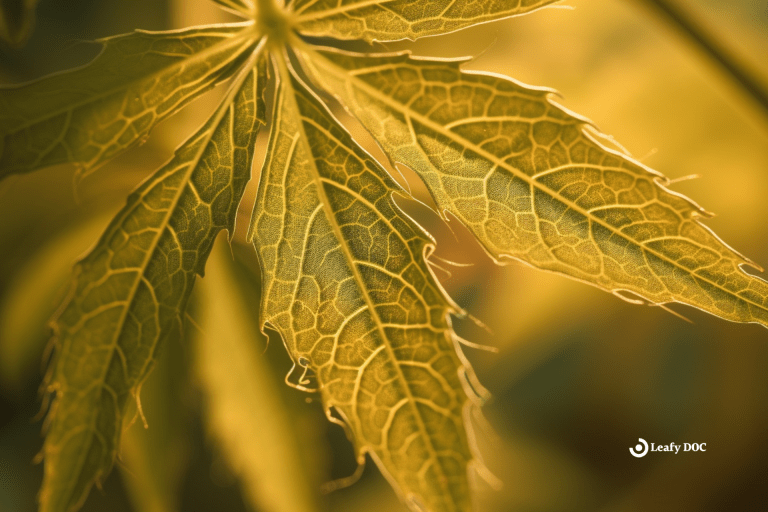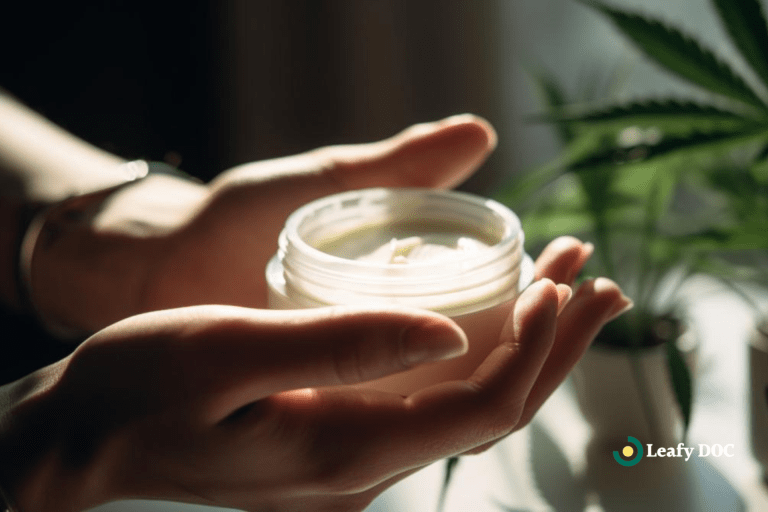Skin Cancer
Will topical medicinal cannabis products help combat symptoms of skin cancer? Find out below.
What is skin cancer?
Skin cancer is an uncontrolled growth of abnormal cells in the epidermis, the outer skin layer, caused by DNA damage that triggers mutations. These mutations lead the skin cells to multiply rapidly and form tumors. The four types of skin cancer are basal cell carcinoma (BCC), squamous cell carcinoma (SCC), melanoma, and Merkel cell carcinoma (MCC).
Types of Skin Cancer
The two leading causes of skin cancer are ultraviolet (UV) rays from the sun and UV tanning beds. If skin cancer is caught early, your dermatologist can typically treat it quickly, but it is crucial to contact a doctor if you suspect it.
Basal cell carcinoma
Basal cell carcinomas are abnormal, uncontrolled growths that arise from the basal cells in the outer layer of the skin. They often develop on skin areas typically exposed to the sun. Most BCCs are caused by cumulative, long-term exposure to UV radiation. It is the most common form of skin cancer, with around 3.6 million cases diagnosed annually in the United States.
Squamous cell carcinoma
Squamous cell carcinoma is an uncontrolled growth of abnormal cells in the squamous cells in the outer layer of the skin. They are common in sun-exposed areas such as the ears, face, scalp, neck, and hands. Cumulative, long-term exposure to UV radiation causes most SCCs. It is the second most common form of skin cancer, with nearly 1.8 million cases diagnosed yearly in the U.S.
Melanoma
Melanoma develops from melanocytes, the skin cells that produce melanin pigment that gives color to the skin. Melanomas often resemble moles and can appear on any body area, even in regions that are not exposed to the sun. Melanoma can be triggered by intense, intermittent sun exposure that leads to sunburn. In 2022, approximately 197,700 new cases of melanoma are expected to occur in the United States.
Merkel cell carcinoma
Merkel cell carcinoma is a rare, aggressive skin cancer. MCC tumors typically appear as firm, painless lesions or nodules. Often associated with a Merkel cell polyomavirus virus, they most often arise in fair-skinned individuals over age 50. Around 3,000 cases of MCC occur in the U.S. annually.
Diagnosis & Treatments
Your doctor may ask you if you have noticed any changes in moles, freckles, or new skin growths. Next, they will examine all of your skin. If a skin lesion looks off, a biopsy may be performed. A tissue sample is removed in a biopsy and sent to a lab for examination. Your dermatologist will tell you if a skin lesion is skin cancer and discuss treatment options.
Treatment depends upon the stage of cancer. They range from 0 to IV, depending on how far it has spread. A biopsy can remove all the cancer tissue if it is small and limited to your skin’s surface.
Other skin cancer treatments, used alone or in combination, may include:
- Cryotherapy
- Excisional surgery
- Mohs surgery
- Curettage and electrodesiccation
- Chemotherapy and immunotherapy
- Radiation therapy
- Photodynamic therapy
Cannabis as an Ancient Skin Care Regimen
Cannabis, especially CBD, is highly prevalent in today’s society. CBD used to control pain and treat skin conditions can be traced back to ancient times, as it was abundant during religious practices and rituals. The earliest uses of cannabis for skincare can be traced back to Ancient Egypt. Pharaoh Ramses II was known to partake in cannabis and encouraged others to use the plant. Back then, hemp assisted in creating buildings and textiles.
During the 20th century, cannabis was extensively criminalized due to a societal outcry; however, changing laws and further research into the compounds within the plant led to a slow but vast reconsideration of their potential health benefits. The use of cannabis is becoming more widely accepted today due to the balancing effects of this particular cannabis-derived compound.
Medical Marijuana and Skin Cancer
Medical marijuana is commonly found to possess significant anti-inflammatory and antioxidant properties, which can quickly help with chronic pain management and chemotherapy-induced nausea. Cannabinoid receptors within a cannabis Sativa plant bind to the brain and peripheral nerve cells and help regulate how you see and feel the pain to reduce symptoms like nausea, vomiting, and severe cancer pain.
Medical marijuana use, as opposed to other non-cannabinoid drugs, appears to be an excellent alternative to treat brain cancer patients and manage pain due to nerve damage or chemotherapy and other cancer treatments. Its medical use can also promote appetite in cancer patients who have experienced appetite and weight loss.
CBD, THC and other cannabinoids could benefit this condition through ointment and oils, creams, salves, or moisturizers to relieve pain and inflammation, provide skin hydration, and stop the irritation of those red patches of skin cells. Some researchers believe topical cannabis products can potentially treat the most common skin disorders. Medicinal marijuana is also known for its anti-inflammatory properties for the skin.
Federal Law & Cancer Patients
The 2018 United States Farm Bill describes hemp as a cannabis plant containing less than 0.3% THC. Hemp oil or CBD oil are products manufactured from extracts of industrial hemp. In contrast, hemp seed oil is an edible fatty oil that is essentially cannabinoid-free. Some products contain other botanical extracts or non-prescription analgesics and are available as oral and topical tinctures for cancer pain management.
According to medical marijuana laws, hemp products containing less than 0.3% delta-9-THC are not scheduled or considered illegal drugs. According to the drug enforcement administration, they can be regarded as Farm Bill compliant for cancer patients.
CAM information
CAM represents cancer complementary and alternative medicine. These complementary and integrative health alternative therapies include:
- massage
- acupuncture
- tai chi
- inhaled marijuana
- green tea
- yoga
- meditation
- natural vitamins and supplements
Best Strains for Cancer patients
When it comes to the best medical marijuana strains to help a skin cancer patient, you need something to treat more severe pain and chemotherapy-induced nausea and vomiting. Since it is still a controlled substance, there isn’t much research regarding the best strains. Fortunately, many strains work extraordinarily to relieve muscle spasms, decrease blood pressure and swelling, and treat nausea, vomiting, tension, anxiety, and depression.
According to the National Cancer Institute and ongoing cancer research:
- Cannabis has been used for purposes for thousands of years.
- By federal law, the possession of Cannabis is illegal in the United States, except within approved research settings; however, a growing number of states, territories and the District of Columbia have enacted laws to legalize its medical and recreational use.
- The U.S. Food and Drug Administration hasn’t approved Cannabis as a treatment for cancer or any other medical condition.
- Chemical components of Cannabis, called cannabinoids, activate specific receptors throughout the body to produce pharmacological effects, particularly in the central nervous system and the immune system.
- Cannabinoids such as dronabinol and nabilone are approved drugs to treat cancer-related side effects and pain. Health insurance companies are far behind in supporting these drugs for use.
- Per the National Cancer Institute, cannabinoids may assist cancer patients with the treatment of cancer-related side effects.
Summary
Finding a way to cope with skin cancer-related pain can be challenging. It’s not easy finding conventional medications that are effective or that our bodies respond to correctly. Many prescription drugs have side effects, so medical marijuana can be a life-changing alternative for some cancer patients.
Remember, marijuana doesn’t cure skin cancer but helps manage chemotherapy and radiation symptoms. Discuss medical cannabis use with your physician and follow their advice on your cancer treatment plan. The severe health consequences of mixing cancer, chemotherapy, or other medications without approval can be painful. We recommend visiting the local dispensary for those who have cleared it with your doctor; you may find the connection between marijuana and skin cancer helps you get some relief.
Last Updated: June 14, 2024
Get Your Medical Card
Connect with a licensed physician online in minutes
Table of Contents
Keep Reading
-
Delicious Cannabis Edibles Recipes To Try
Discover a delectable collection of cannabis edibles recipes that will tantalize your taste buds and elevate your experience. From savory dishes to sweet treats, explore these must-try recipes today!
-
Why Are My Weed Plants Turning Yellow?
Is your weed plant turning yellow? Learn the ultimate solution to vibrant green marijuana plants and how to fix it now! Don’t miss out on this must-read guide. Click here for expert tips!
-
Topical Cannabis For Pain Management: How It Works
Learn how topical cannabis can effectively manage chronic pain and why it’s becoming a popular choice. Dive into the science behind cannabis topicals for pain relief now!



